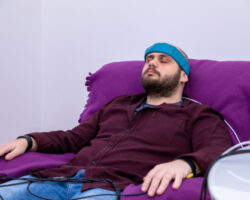 In today’s fast-paced world, maintaining mental focus and concentration is becoming increasingly challenging. With distractions constantly buzzing around us, it is no surprise that many individuals struggle to stay focused and perform at their best. However, there is hope in the form of biofeedback therapy. This innovative approach to improving mental focus and concentration has gained significant popularity in recent years. In this blog post, we will explore the concept of biofeedback therapy and delve into how it can help individuals enhance their cognitive abilities.
In today’s fast-paced world, maintaining mental focus and concentration is becoming increasingly challenging. With distractions constantly buzzing around us, it is no surprise that many individuals struggle to stay focused and perform at their best. However, there is hope in the form of biofeedback therapy. This innovative approach to improving mental focus and concentration has gained significant popularity in recent years. In this blog post, we will explore the concept of biofeedback therapy and delve into how it can help individuals enhance their cognitive abilities.
Understanding Biofeedback Therapy:
Biofeedback therapy is a non-invasive treatment method that aims to empower individuals by providing real-time information about their own physiological responses. By utilizing specialized equipment, individuals are able to monitor and gain control over various physiological functions. These functions include heart rate, muscle tension, brain activity, and even skin temperature. The information obtained through biofeedback helps individuals gain insight into their body’s reactions and teaches them how to self-regulate these functions.
Improving Mental Focus:
One major benefit of biofeedback therapy is its ability to improve mental focus. Through monitoring brain activity using electroencephalography (EEG), individuals can enhance their ability to concentrate and focus. In biofeedback sessions, individuals learn to recognize patterns associated with a focused state of mind. They can then practice techniques to promote this state, such as deep breathing or visualizations. By utilizing this feedback loop, individuals gradually improve their mental focus, ultimately leading to enhanced performance in various areas of life.
Enhancing Concentration:
Concentration is another crucial aspect of cognitive performance, and biofeedback therapy can significantly enhance it. By monitoring muscle tension, individuals can become more aware of tension build-up in their body during periods of low concentration. Through biofeedback sessions, individuals learn relaxation techniques to reduce muscle tension and promote a more focused state. This newfound ability to recognize and release tension allows individuals to stay engaged and concentrated for longer periods, resulting in improved productivity and performance.
Stress Reduction:
Stress is a common enemy of mental focus and concentration. When under stress, many individuals find it difficult to think clearly and maintain a high level of focus. Biofeedback therapy can play a pivotal role in stress reduction. By monitoring heart rate variability and skin conductance levels, individuals can identify triggers that elevate stress levels. Through practices like guided imagery and progressive muscle relaxation, individuals can learn to modulate their stress response and achieve a more relaxed state. Reduced stress levels directly contribute to improved mental focus and concentration.
Improving Sleep Quality:
Quality sleep is crucial for optimal cognitive functioning. Unfortunately, many individuals struggle with insomnia and other sleep-related issues that hamper mental focus and concentration. Biofeedback therapy can assist in improving sleep quality. By monitoring brain waves associated with sleep, individuals can gain insight into their sleep patterns and identify areas for improvement. Through techniques like neurofeedback, individuals can train their brain to achieve healthier sleep patterns, resulting in improved mental focus and concentration during waking hours.
ADHD and Biofeedback Therapy:
Attention Deficit Hyperactivity Disorder (ADHD) is a common condition characterized by difficulties in maintaining attention and focus. Biofeedback therapy has shown promising results in treating ADHD symptoms. By monitoring brainwave patterns, individuals with ADHD gain insight into their brain’s activity during periods of inattention. Through neurofeedback training, individuals can learn to regulate their brainwaves and improve their ability to concentrate. Biofeedback therapy provides individuals with ADHD a drug-free alternative for managing their condition and optimizing their mental focus and concentration.
Conclusion:
Biofeedback therapy offers a revolutionary approach to improving mental focus and concentration. By empowering individuals to monitor and self-regulate their physiological functions, this therapy allows for better cognitive functioning. Whether through improving mental focus, enhancing concentration, reducing stress, improving sleep quality, or assisting individuals with ADHD, biofeedback therapy holds tremendous potential. As we continue to navigate a world filled with distractions, biofeedback therapy provides a pathway to unlock our full cognitive potential.
Got Questions? Let Us Help!
Blu Indigo Spa & Wellness focuses on whole-body wellness by delivering relaxation and therapeutic massage and skin care treatments to help you feel renewed after dealing with the stresses of your everyday life. Each of our services is intended to treat you! At Blu Indigo Spa & Wellness, we created a haven of tranquility tailored to give the finest holistic health, beauty, and well-being experiences while revitalizing your mind, body, and spirit. Contact us today!
Biofeedback Techniques for Sleep Disorders: A New Path to Better Sleep
Sleep disorders can significantly impact our overall well-being and quality of life. If you struggle with insomnia, restless legs syndrome, or other sleep disorders, you may have tried various treatments with little success. However, there is a promising new approach to improving sleep through the use of biofeedback techniques. In this blog post, we will explore how biofeedback can help manage sleep disorders and provide you with a better understanding of this innovative treatment option.
Understanding Sleep Disorders
Before delving into biofeedback techniques, it is important to understand the different types of sleep disorders that can affect individuals. Some common sleep disorders include:
1. Insomnia: Insomnia is characterized by difficulty falling asleep or staying asleep. It can lead to daytime fatigue, decreased concentration, and irritability.
2. Restless Legs Syndrome (RLS): RLS is an uncomfortable sensation in the legs that can cause an irresistible urge to move them. This condition often disrupts sleep and can negatively impact overall sleep quality.
3. Sleep Apnea: Sleep apnea is a condition characterized by pauses in breathing during sleep. These interruptions can lead to excessive daytime sleepiness and increased risk of other health conditions.
Biofeedback: A Non-Invasive Solution
Biofeedback is a non-invasive technique that uses sensors to provide real-time feedback about specific physiological responses. By monitoring these responses, individuals can gain a better understanding of their body’s reactions and learn to control them. Biofeedback techniques have shown promising results in addressing sleep disorders by helping individuals gain better control over their physiological responses associated with sleep.
Types of Biofeedback for Sleep Disorders
1. Electroencephalography (EEG) Biofeedback: EEG biofeedback, also known as neurofeedback, measures brainwave activity. By using sensors placed on the scalp, individuals can see real-time feedback on their brainwave patterns. This technique has been shown to improve sleep quality by training individuals to regulate their brainwave activity and promote relaxation.
2. Heart Rate Variability (HRV) Biofeedback: HRV biofeedback focuses on heart rate patterns and the variations between heartbeats. By using sensors to monitor heart rate, individuals can learn to regulate their breathing and heart rate, promoting relaxation and reducing stress levels. This technique has been shown to be effective in improving sleep quality and reducing insomnia symptoms.
3. Electromyography (EMG) and Body Temperature Biofeedback: EMG biofeedback measures muscle tension and relaxation, while body temperature biofeedback focuses on monitoring changes in body temperature. By using sensors to track these responses, individuals can learn to recognize and reduce muscle tension and increase peripheral blood flow, promoting relaxation and better sleep patterns.
Benefits of Biofeedback for Sleep Disorders
1. Non-Invasive: Unlike some other treatments for sleep disorders, such as medication or invasive interventions, biofeedback techniques are non-invasive and do not require any invasive procedures or medications. This makes it a safe and accessible option for individuals seeking a more natural and less intrusive approach to managing their sleep disorders.
2. Personalized Approach: Biofeedback techniques are highly individualized. Each individual’s physiological responses are unique, and biofeedback allows individuals to understand and address their specific triggers and responses. This personalized approach ensures that individuals can develop strategies tailored to their specific needs, enhancing the effectiveness of the treatment.
3. Natural and Sustainable: Biofeedback focuses on teaching individuals self-regulation techniques that can be carried over into their daily lives. By learning to recognize and modulate their physiological responses, individuals can develop sustainable strategies for promoting relaxation and better sleep. This natural approach reduces dependency on external interventions and empowers individuals to take control of their sleep patterns.
Conclusion
Sleep disorders can significantly impact our physical and mental well-being. If you have struggled with insomnia, restless legs syndrome, or other sleep disorders, considering biofeedback techniques for managing your symptoms could be a game-changer. With its non-invasive nature, personalized approach, and focus on sustainable self-regulation, biofeedback offers a new path to better sleep. Consult with a qualified professional to explore which biofeedback technique may be most suitable for your specific sleep disorder and embark on a journey towards achieving the restful sleep you deserve.
Got questions about what biofeedback can do for you? Let us help! Contact us today to learn more!
 In today’s fast-paced world, maintaining mental focus and concentration is becoming increasingly challenging. With distractions constantly buzzing around us, it is no surprise that many individuals struggle to stay focused and perform at their best. However, there is hope in the form of biofeedback therapy. This innovative approach to improving mental focus and concentration has gained significant popularity in recent years. In this blog post, we will explore the concept of biofeedback therapy and delve into how it can help individuals enhance their cognitive abilities.
In today’s fast-paced world, maintaining mental focus and concentration is becoming increasingly challenging. With distractions constantly buzzing around us, it is no surprise that many individuals struggle to stay focused and perform at their best. However, there is hope in the form of biofeedback therapy. This innovative approach to improving mental focus and concentration has gained significant popularity in recent years. In this blog post, we will explore the concept of biofeedback therapy and delve into how it can help individuals enhance their cognitive abilities.